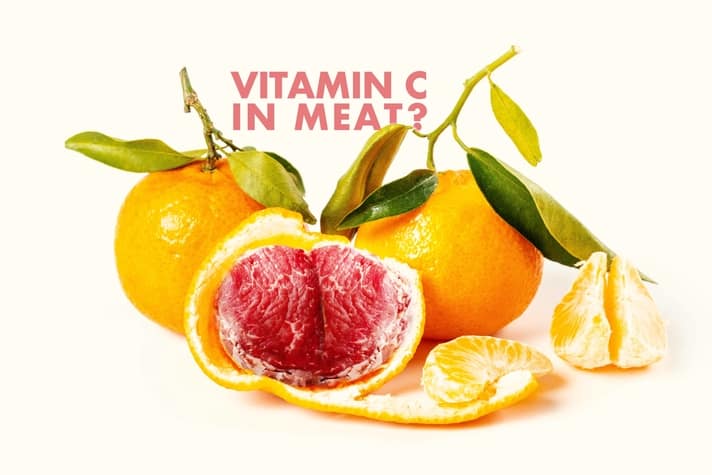Do You Need Vitamin C On The Carnivore Diet?

As an Amazon Associate we earn from qualifying purchases made on our website. If you make a purchase through links from this website, we may get a small share of the sale from Amazon and other similar affiliate programs. You can read our complete legal information for more details. By using this site, you agree the information contained here is for informational purposes only. For specific medical questions, consult your doctor. NO information on this site should be used to diagnose, treat, prevent or cure any disease or condition.

Chances are you are ready to start an all meat carnivore diet but you’re afraid you won’t get enough Vitamin C because after all, Vitamin C comes from fruits and veggies and not from meat. The thing is that this is only somewhat true.
Yes vitamin C is essential for living and you will die without it but there are major caveats when it comes to a low carbohydrate, all meat, no sugar diet.
This post will show that when you go carnivore you need less vitamin C, meat actually has vitamin C and there are 1000s of people that eat only meat and have had no complications as a result of not supplementing vitamin C.
What Is Vitamin C?
Vitamin C, which is also known as ascorbic acid and ascorbate is a powerful antioxidant found in various foods like fruits and veggies and supplements as well as meat which you will see shortly.
WebMD states, “Vitamin C is a powerful nutrient which helps aid the body by giving it protection from immune deficiencies, cardiovascular disease, prenatal health problems, eye disease, and even skin wrinkling.” (1)
Vitamin C is a key component for enzymatic reactions which pertain to the production of collagen and carnitine. When combined with Vitamin E it helps prevent the damage of lipid cells which in turn can help prevent disease and tissue damage as noted by researchers in this study, “Lipid peroxidation and tissue damage.” (2)
What Happens When Deficient in Vitamin C?
From what I have read most people that become vitamin C deficient start to see health issues in eight to twelve weeks with some more minor symptoms like fatigue, weight loss, lack of appetite, and mental problems.
As time goes on they will experience anemia, bone pain, inflammation/swelling, bleeding skin, gum disease, hair loss, wounds that won’t heal, breathing issues, and depression.
The longer you go the more severe the symptoms get which leads us to Scurvy. (3)

Lack of Vitamin C Is Scurvy?
Scurvy is that funky disease we would hear sailors and explorers getting back in the 1800s but what is it? Historically, scurvy has been a problem for humans and their lack of nutrition forever. It’s basically the name given to vitamin deficiencies most notably Vitamin C.
The symptoms are nasty and include things like loss of teeth, anemia, random bleeding, loss of energy, or even death. Furthermore, it disrupts the immune system, metabolism of cholesterol, and the absorption of iron.
What about collagen?
The lack of vitamin C will also hinders the making of collagen which is crucial for the building of connective tissue and blood vessels. When this happens your bodies tissues begin to break down.
Scurvy makes you weak!
During the onset of scurvy one may feel fatigued. When you don’t have enough Vitamin C your body has a challenge with the production of dopamine, rorepinephrine, epinephrine and carnitine which are all factors involving mood and energy.
If you are curious about scurvy Medical News Today wrote a nice article, “Everything You Need To Know About Scurvy.”
Glucose Is The Brother Of Vitamin C
Okay vitamin C and Glucose are not related by blood literally but they are related in how the human body uses them plus their molecular structure is almost exact.
This also means they are absorbed into our bloodstream the same way and in fact compete with each other. Basically, when you eat a high carb/high sugar diet your body is absorbing the glucose over the vitamin C. Vitamin C and glucose are in direct competition with each other.
This theory destroys the marketing behind oranges and their abundant and nutritional source of vitamin C. When you drink orange juice, because of its high sugar content you essentially don’t get the vitamin C, the glucose is taken up by your cells instead. Lemon juice comes to mind as well..
People on high fruit/high carbohydrate diets that eat a lot of sugar may in fact be deficient in Vitamin C. (4)
Inflammation Theory
When people switch to a carnivore diet generally they experience less inflammation. We are talking joint inflammation, gut inflammation and even skin inflammation.
When your body has inflammation it requires antioxidants to counter these issues. Because Vitamin C is an antioxidant and your body has less inflammation is needs less Vitamin C.
Here we have Dr. Ken Berry discussing Vitamin C and the Carnivore Diet.
How Much Do You Need?
This is basically how Dr. Kevin Stock explains it; people on a traditional Standard American Diet high in sugar and carbs would need about 10 mg/day to not get scurvy but those of us that are low carbohydrate, low sugar require even less as our vitamin C is not competing with glucose when getting absorbed onto our bodies. (5)
When you go full carnivore diet your body uses substances in meat known as hydroxylysine and hydroxyproline for the formation of collagen which in turn makes your body less dependent on Vitamin C.
Oh, Meat Has Vitamin C?
The USDA did some testing onto the nutrients available in meat but they left out the part that shows meat actually has Vitamin C.
Private lab testing has indicated that meat does in fact have Vitamin C about 10/mg per pound. If one pound of meat contains 10mg of vitamin C and you eat 2 pounds of day you essentially get over that 10mg recommendation.
Want More Vitamin C in Meat?
As you saw Vitamin C is present in meat but if you want to increase the amounts try liver, spleen, and pancreas. Some people even supplement with desiccated liver pills . These are the top 3 options of Vitamin C.
- Pork Liver
- Cow Liver
- Chicken Liver
Vitamin C Myth Destroyed?
It’s a very simple theory as to why those on the carnivore diet don’t require high amounts of Vitamin C and those on high carbohydrate and high sugar diets do.
The competition factor between glucose and Vitamin C is the main factor. If your diet has very low sugar in it the vitamin C eaten in meat is adequate.
Also, it should be noted that meat is more bio-available and thus absorbed by your body more thoroughly when compared to fruits and veggies. This is why those on the carnivore diet don’t you most likely don’t need to take supplements of Vitamin C or sneak in a fruit or veggie high in Vitamin C. (6)
Need Evidence and Reassurance?
Check out this video of Dr. Shawn Baker explaining what happens to the need for Vitamin C when one hoes on the carnivore diet.
Of course, the idea of a carnivore diet is scary and seems like a crazy idea. I get it and I was concerned when I took the plunge. I was a strict carnivore for months and never experienced any problems as a result of a lack of vitamin C.
In fact, the carnivore diet isn’t new and has been around for ages. 1000s of people are on a strict meat only diet and do not experience any complications as a result of the lack of vitamin C. People have been strict carnivores for 10-15 or 20 years and have no issues.
Arctic explorers back in the day also noted that fresh meat prevented and cured scurvy. The Inuits, a 90-100% carnivore eating people don’t get scurvy.
Meat and Carnivore Diet enthusiast Dr. Shawn Baker has been a strict carnivore for the past 3 years and he has not experienced any problems or developed scurvy.
I highly recommend Dr. Baker’s book, “The Carnivore Diet”. It’s a must-have for all carnivore dieters!
Need further proof go check out the World Carnivore Facebook group and see the results for yourself. In fact, it’s a great way to stay motivated and ask questions.
Ready To Try The Carnivore Diet?
The carnivore diet is basically an elimination diet that has produced many great results for people around the globe suffering a ton of health symptoms. Just look at the testimonials at MeatRX.
When you go carnivore you are essentially eliminating any potential factors which are detrimental to your health. You can also learn more at our Wild Lumens YouTube channel. Subscribe and have some fun with us!
Disclaimer: I’m not a doctor. Consult with and ask your doctor about any diet or medical-related questions. No information on this site should be used to diagnose, treat, prevent, or cure any disease or condition.



